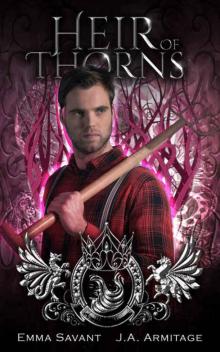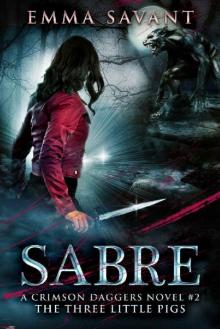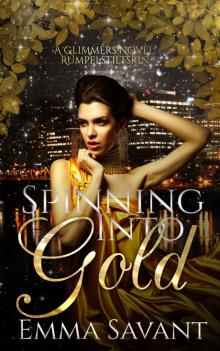- Home
- Emma Savant
Spinning Into Gold Page 2
Spinning Into Gold Read online
Page 2
“Absolutely,” Dad said. “We look forward to talking with you.”
Words were way, way too hard. I swallowed and nodded, trusting that Mr. Rumpel would know what I wanted to say.
He went to the counter and handed a couple of bills to the waitress. Her eyebrows went up when she saw them, and he waved a dismissive hand at her and strode out of the diner. The bell clanged behind him.
Dad and I stared at each other.
And then, finally, I let out a tiny scream.
“We have to play it cool,” Dad said, even though it was way too late for that. “Give it a week or two to let him know we’re thoughtfully considering this.”
“I give us a day,” I said.
Dad sipped his milkshake, which, like mine, had melted a bit during the conversation.
“You’re right,” he finally said, the corners of his eyes crinkling to match his grin. “I’ll mirror him tomorrow.”
Chapter 2
“I’m done,” Briana said from inside my magic mirror. She was using her compact mirror to call me—I could see her car behind her. “I’m just done. Two to Tango will march on into eternity, selling overpriced dancewear and making employees’ lives hell, but I will not be part of it.”
“Good for you,” I said.
Outside my apartment, a car door slammed. I pulled back the brightly patterned scarf that served as a curtain and glanced out the window to see a woman stepping out of a tiny car, a leather bag slung over her shoulder.
“Denise had the balls to ask if I would be willing to cover Todd’s shift before I left,” Briana said. Her layered hair swung as she shook her head fiercely. “I told her where she could shove it. Todd is not even my problem anymore.”
“Good,” I said. “Way to get out of there.”
I glanced out the window again, even though no sound suggested Dad was home and ready to get to our meeting with Mr. Rumpel.
Where was he? We couldn’t be late.
“But now I’m going to be broke in like three days, so I’ve got to find something else,” she said.
“I thought you were going back to college.”
“Not until I know what I want to do,” she said. “I spent one semester majoring in magical medicine and that was more than enough.”
“Not everyone has to be a doctor,” I said.
“They do in my family.”
“Maybe Sadie knows somewhere that’s hiring.”
“I hope so.”
There he was. He’d managed to snag one of the spots right outside our apartment building—a near-miracle, in this part of Portland—and he was getting out of the car.
“Bri, I’ve got to go,” I said. “Meeting with the new agent.”
She clapped her hands. “So excited for you!”
“Me too,” I said. I blew her a quick kiss and tapped the edge of the mirror with my wand. Briana’s image dissolved and left only my face, flushed with excitement. I let the mirror fall back onto my bed and bolted out of my room.
Dad was barely inside the apartment stairwell by the time I reached him. I had a plastic-wrapped sandwich in one hand and my purse in the other.
“Let’s go,” I said. I shoved the sandwich in his hand. “Eat on the way.”
The roads were terrible with rush-hour traffic, as always.
“We should have rented a carriage on the Rainbow Road,” I muttered, craning my neck to look past the line of cars that stretched down the street in front of us. That highway system was reserved only for Glims and stretched high over the city, far away from the mess of commuters below.
Dad tapped the steering wheel. “We’ve got forty-five minutes,” he said. “We’ll be fine.”
He was almost right. We pulled up to Mr. Rumpel’s glossy downtown building exactly one minute after six. Dad pulled into the parking garage while I jiggled my knees up and down like that would contain my impatience. Once he’d parked in the dim, dusty-smelling garage, I climbed out, slammed the door, and shifted from foot to foot while Dad shut the car off.
How could he wait like that?
I took a deep breath and silently found middle C in my mind. My throat tensed silently until it hovered right on the note, needing only a bit of air to turn into music. I’d learned that trick forever ago, back when I still got stage fright. A few deep breaths couldn’t get rid of my feelings entirely, but they seemed to give me more control over my actions and stop me from doing things like screaming at Dad to get a move on already.
I couldn’t scream and strain my voice. What if Mr. Rumpel needed me to sing?
We made our way to the elevator. Stepping inside it was like stepping into a different world. Where the parking garage had been grimy and cold, the elevator was walled in mirrors with an antique bronze patina and tiled with black and gold marble. I remembered Mr. Rumpel’s instructions and pressed the sturdy bronze button that said 28.
The elevator door slid closed, and a woman’s cool voice announced, “Going up.”
The elevator rose, and my blood pressure seemed to rise with it.
What if he’d changed his mind? What if he didn’t want to represent me after all? What if this meeting wasn’t about signing contracts, but about him saying it had all been a joke and how could I possibly think someone like him could want to manage the middling career of someone like me?
My heart pounded so hard I could have sung aloud to the beat. Next to me, Dad seemed nervous, too. Not nervous like I was—that wasn’t his way—but enough to fidget with his phone as the floors passed.
“Floor twenty-eight,” the elevator announced, sounding exactly as tranquil as I wasn’t.
The doors slid open with a ding, and Dad and I stepped out into a polished lobby.
This floor matched the elevator. We walked across the same gold-veined marble, with antique gold and crystal chandeliers illuminating the room from the high ceiling above us. Behind the polished bronze desk, an attractive young woman sat behind a nameplate that said Mari Deacon. The nameplate was jet black, the same color as her bobbed hair. She wore a black sheath dress with large bronze earrings. I wondered if Mr. Rumpel’s receptionists always matched the decor.
“This is Dior Miller,” Dad said. “We have an appointment with Mr. Rumpel.”
“Of course,” Mari said. “He’s expecting you. Right this way.”
She led us through a bronze door to the side of her desk. It opened directly onto an office. The space made me feel instantly tiny and insignificant.
The room was huge. A rug the size of our living room spread out in front of us, and on the other side of the room, past a cluster of elegant black leather chairs and an antique coffee table, sat August’s desk. Behind that, windows opened onto a view of downtown Portland, glittering dully in the twilight.
My gaze darted around the room, taking in the polished built-in bookshelves that lined the half of the room that wasn’t overtaken with windows, the painted landscapes that hung in elaborate gold frames on the walls between the shelves, and the three chandeliers that hung above us.
Forget the living room; this office was larger than my and Dad’s whole apartment.
“Welcome!” Mr. Rumpel said.
I jumped. I hadn’t even noticed him there, standing in a corner of the room next to a bookshelf. He slid a volume back in with a matching set and strode over to us. His suit was jet black today, tailored so that the waist nipped in, making him look even more sophisticated than he had at the diner.
“Thanks,” I said. “How’s it going?”
“Brilliantly, as always,” he said. He flashed me that dazzling smile, and I wondered if his teeth were that white as a result of dentistry or a glamour.
I still didn’t know what kind of Glim he was. Some Glimmers could identify other races almost immediately, but my faerie gifts had always leaned toward the musical. Identifying magic was outside my wheelhouse. Anyway, as Dad had always said, race didn’t matter. Anyone could enjoy my voice, and no one Glim group had a monopoly on making great m
usic.
“Have a seat,” Mr. Rumpel said. “Can I get you anything? Tea? Coffee?”
“Water, please,” I said.
“Tea would be great,” Dad said.
Dad didn’t drink tea. He was just trying to look fancy.
Mr. Rumpel gestured, and I realized the receptionist was still standing behind us. She nodded at him and disappeared, her heels clacking against the marble floor of the lobby.
I moved to sit next to his desk, but he waved us over to the leather chairs. I sank into the seat, the leather giving just right against my weight. Dad sat next to me, and Mr. Rumpel sat next to him and across from me. I knew it was so he could study me, and I sat up straighter and tried to appear like the kind of client he might want to take on.
“How was the last leg of the tour?” he asked.
“Great,” I said. My voice was too peppy, too enthusiastic with nerves, but he wouldn’t know that. He didn’t get me like Dad or Briana or Sadie did, not yet. “The fans were great and Cassidy was such a great mentor.”
Too much “great,” I thought, and wished I’d practiced some small talk before we’d gotten here.
“You had rave reviews,” Mr. Rumpel said. “Of course, we all know that’s not enough to build a career on.”
“We’ve learned that,” Dad said. “Dior here has all the talent, but it takes more than talent to make the world pay attention.”
“It requires a special skill set,” Mr. Rumpel agreed.
The door opened and Mari came back, wheeling a small cart with beverages on it. She handed me a tall glass of water with a lemon wedge, gave Dad his tea, and handed Mr. Rumpel a small glass of… something. I didn’t drink much alcohol—I couldn’t stand the way it made me feel—and had no idea what it was, only that it was golden and elegant. He took a tiny sip and nodded at Mari, and she left the room with the grace of a shadow.
“I’ve been researching your career,” Mr. Rumpel said. “You’ve had quite a few stops and starts.”
I squeezed the glass, glad to have a prop to help me hide my nervous energy. “It’s hard to keep a career going,” I said. “I’m good at performing, but I don’t know how to market myself. I’ve gotten a little traction on social media, and fans are usually willing to buy my music, but… I don’t know.”
“It’s hard to fan interest into a flame,” Mr. Rumpel said. He sounded like he’d heard this story a hundred times, and probably had. I hoped he knew how to turn a whole lot of not-much into a happy ending. “You have two albums out?”
“Plus a few singles,” I said. “I sell them online. It’s a good way to remind people I exist.”
“You shouldn’t have to remind them,” he said. “You should make such an impression that they’ll never be able to forget about you.”
Yes, something in me screamed. Yes, that. More of that.
He had to take me on. I would shatter into a million brokenhearted pieces if he didn’t take me on.
“That’s what I’m hoping you can help with,” I said. I met his eyes and held his dark, warm gaze for a long moment, willing him to please understand how much I wanted this—needed this.
He smiled, and raised his glass to me.
“I’d like to see some more from you,” he said. “I saw your Cassidy concert, and I’ve listened to your albums, but I need to see more of—this.” He waved a hand, gesturing at me in my entirety. “I need to see you perform again.”
“Of course,” I said. I set my drink down on a coaster on the coffee table, and put my hands in my lap. “What would you like to see?”
“Surprise me,” he said.
I could do that. Some people needed expectation and guidelines in their lives, but I didn’t. Not when it came to my music. I scanned his face, tried to read his energy and get a feel for what would delight him. Then I stood up.
“This is ‘Not Another Echo,’” I said. I walked past the chairs and to the center of the carpet, giving myself enough room to move around. Own the space, one of my first vocal coaches had said, and I had always tried.
I took a deep breath, shook out my arms to get a sense for where my body was and how everything felt, and then I was on.
“Walking by, I see my reflection,” I sang, starting out low and slow, caressing the words. “Every day, the same old direction. Every morning just the same, doing everything the way you told me to.”
The song built. I let it take me where it wanted to go. The music knew more than I did, always, and the best thing to do was to fill my lungs with air and then get out of the way.
“I am not your echo anymore.” The chorus picked up steam, the words pummeling a rhythm wrapped up with the satisfaction of really giving it to someone who deserved it. It was everything I’d wanted to say to Matthew, my second boyfriend, and hadn’t been able to find the words for until long after we’d broken up. “I broke your spell, I’ll show myself the door.”
The song wound down. “I need something more,” I sang, then lowered my voice, letting the words stretch out and fade like an echo. “I need something more.”
The silence when I was done wasn’t as deafening as usual. It had just been me filling the space, instead of me and a microphone and a full band and enormous speakers turned up loud enough to fill an arena. Even so, I could see that Mr. Rumpel was impressed.
But not quite impressed enough.
He clapped, slowly and thoughtfully. Dad gave me a discreet thumbs-up.
“That was good,” he said. “But you performed it like you were playing to a room of Humdrums.”
I felt heat begin to rise up my face. Of course. I was stupid. I’d spent so many months performing for Cassidy’s fans that I’d almost forgotten what it was like to sing to a Glim audience.
I ran my hands down my hips, wiping the sweat off onto my tight jeans. The jeans were dumb. I should have worn a dress or something.
“Do it again,” he said. “And this time, sing with all of you.”
I took a second to breathe, to get the magic flowing through my body. When I sang for Humdrum audiences, the sound was in my lungs and my vocal cords and my ears.
When I sang for Glims, I could feel the life of the music in my bones.
“Walking by, I see my reflection,” I sang.
The muscle memory of how I performed this song for magical audiences came flooding back. I closed my eyes and felt tingles across my skin. “Every day, the same old direction.”
The music was alive, now, crawling down my arms and flying up into the air. I couldn’t see myself, but I knew, at an instinctive level, what was happening. Lights were playing across my face. An impossible wind picked up my hair, lifting it just slightly to create a sense of wildness and turmoil. The rhythm of the chorus hit my audience like a hammer pounding into their sternums, forcing the emotion in deeper than sound alone could take it.
When I finished, I held still, trying to catch my breath.
No, not my breath. My magic. My energy swirled and danced around inside me, and I had to take a moment to seize it and reel it back in, to learn to be a regular person again.
“Magnificent,” Mr. Rumpel breathed. His face was rapt with interest and his eyes sparked with excitement. “That’s what I wanted to see, Dior. You’re a treasure.”
I smiled. I couldn’t help it. The happiness from his approval bubbled up in me like carbonation and I had to fight to keep from dancing a little.
“Does that mean you’ll take her on?” Dad said.
“Oh, yes,” Mr. Rumpel said, not taking his eyes from me. “And I’m going to turn her into gold. I’ll draw up the contract.”
Chapter 3
I thanked the waiter for my water and leaned back in the upholstered dining chair. The gentle lull of soft conversation and clinking utensils filled the air around us. Dad slid his fingers across his phone screen.
“The Cyclopes are beating the Manticores fifteen to nine,” he said.
I had no interest in sports, but had learned enough to be able to make sma
ll talk with fans who followed the various Glimmering games. Dad was talking about the latest Orbs match, a standoff between the Cincinnati Cyclopes and the Minneapolis Manticores.
Orbs games were a stunning display of athletics and spellwork, with opposing teams racing across a field while enchanting three glowing orbs that flew through the air and tried to knock players to the ground or out of bounds. The goal was to stay as far away as possible from the orbs, while still remaining close enough to force them across the field and into the goals. Matches always got ugly, with players constantly trying to put each other in harm’s way without getting caught. It wasn’t my kind of thing, but Dad was low-key obsessed.
“Aaron’s been dominating this season,” he said, his eyes raking down a live feed of updates from the latest game.
“I really appreciate you coming to see Mr. Rumpel with me while the game’s on,” I said.
“Hey, anything for my girl,” he said, not taking his eyes from the screen.
I pulled out my own phone. Sadie had sent me a picture of her dog, passed out on her living room carpet with his belly up and his head twisted at an almost impossible angle. I sent back a string of heart emojis, then checked the time.
It was six exactly, and, as though he’d been waiting outside to make his appearance right on time, Mr. Rumpel entered the room. He waved off the hostess and made his way to our table unescorted.
“Delightful to see you again,” he said, holding out a hand. I shook it, and he shook Dad’s hand, too, and settled in the remaining empty seat.
He asked about our day, and we asked about his while the waiter brought him a drink. We ordered—shrimp scampi for him, alfredo for Dad, and eggplant parmesan for me—and Mr. Rumpel set a black folder on the table.
“I brought your contract,” he said, smiling. Butterflies woke up in my stomach and flew around. I could practically feel them landing on my ribs and then taking off again, dizzy with excitement.
I took the folder and opened it. The paper was there, black type on cream paper, with a gold header that said Rumpel Talent Management in the same font as had been on his business card.

 Glimmers of Thorns
Glimmers of Thorns Holly North
Holly North Glimmers of Garlands
Glimmers of Garlands Heir of Thorns
Heir of Thorns Glimmers of Glass
Glimmers of Glass Sabre
Sabre Glimmers of Scales
Glimmers of Scales Stiletto
Stiletto Crimson Daggers- The Complete Trilogy
Crimson Daggers- The Complete Trilogy Spinning Into Gold
Spinning Into Gold